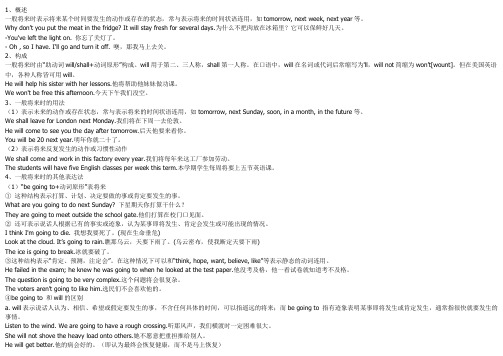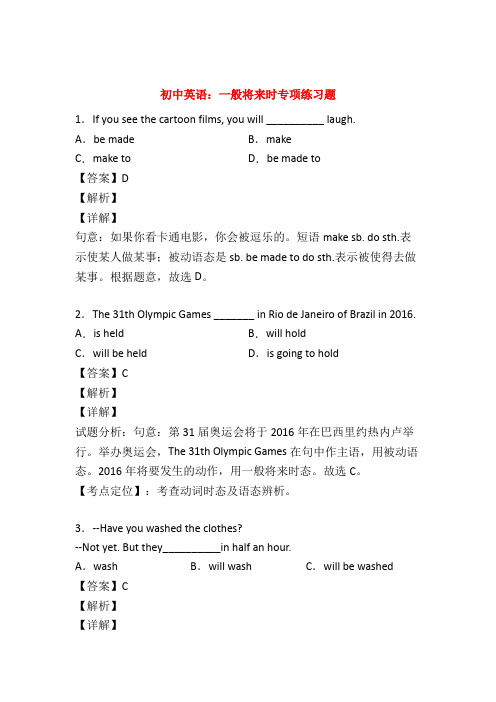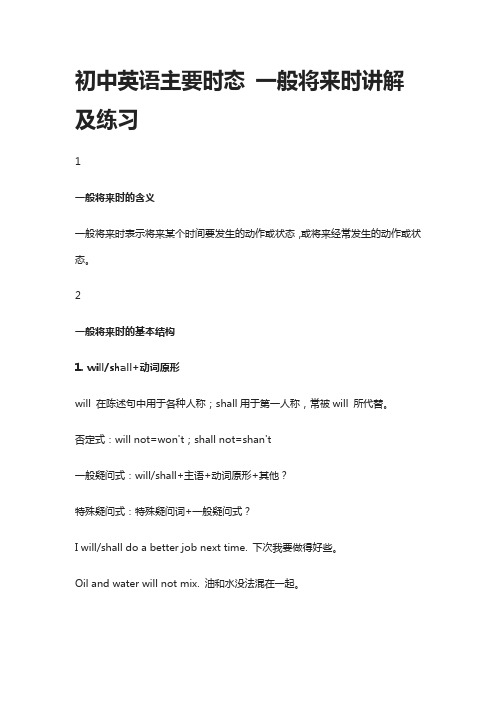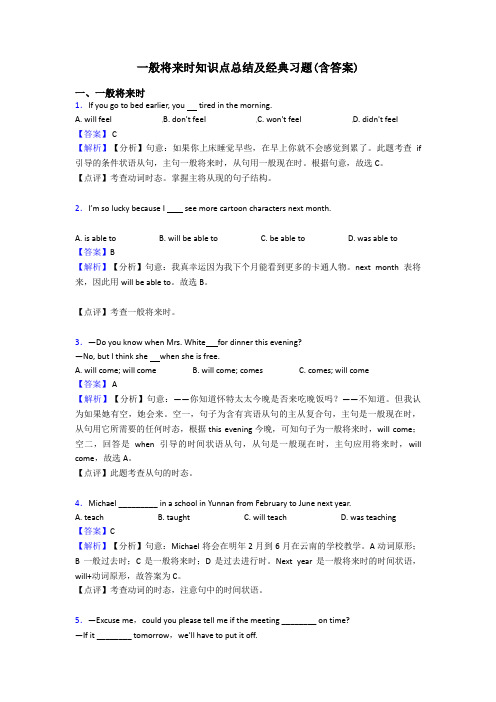一般将来时态讲义及练习题
- 格式:doc
- 大小:55.00 KB
- 文档页数:9

1、概述一般将来时表示将来某个时间要发生的动作或存在的状态,常与表示将来的时间状语连用,如tomorrow, next week, next year等。
Why don’t you put the meat in the fridge? It will stay fresh for several days.为什么不把肉放在冰箱里?它可以保鲜好几天。
-You've left the light on. 你忘了关灯了。
- Oh , so I have. I'll go and turn it off. 噢,那我马上去关。
2、构成一般将来时由“助动词will/shall+动词原形”构成。
will用于第二、三人称,shall第一人称。
在口语中,will在名词或代词后常缩写为'll,will not简缩为won’t[wount]。
但在美国英语中,各种人称皆可用will。
He will help his sister with her lessons.他将帮助他妹妹做功课。
We won't be free this afternoon.今天下午我们没空。
3、一般将来时的用法(1)表示未来的动作或存在状态,常与表示将来的时间状语连用,如tomorrow, next Sunday, soon, in a month, in the future等。
We shall leave for London next Monday.我们将在下周一去伦敦。
He will come to see you the day after tomorrow.后天他要来看你。
You will be 20 next year.明年你就二十了。
(2)表示将来反复发生的动作或习惯性动作We shall come and work in this factory every year.我们将每年来这工厂参加劳动。

人教版英语八上时态专讲--一般将来时讲义+习题一般将来时一般将来时表示将来某一时段的动作或状态,或将来某一段时间内经常的动作或状态。
Will+be will+do含义:一般将来时表示将来某一时刻的动作或状态,或将来某一段时间内经常的动作或状态。
结构:①Will/shall+动词原形肯定句:主语+will/shall+动词原形+其他否定句:主语+will/shall+not+动词原形+其他一般疑问句:Will/Shall+主语+动词原形+其他肯定回答:Yes,主语+will/shall;否定回答:No,主语+will/shall not.特殊疑问句:特殊疑问词+一般疑问句②be going to+动词原形肯定句:主语+be(is/am/are)+going to+其他否定句:主语+be(is/am/are)+not+going to+其他一般疑问句:Be(Is/Are)+主语+going to+其他? 肯定回答:Yes,主语+be/否定回答:No,主语+be not.特殊疑问句:特殊疑问词+一般疑问句表示将来的时间状语:tomorrow(明天), next week(下周);in the future(将来);in a year(一年以后)等。
一般将来时由助动词shall(第一人称),will(所有人称)动词原形构成。
美式英语则不管什么人称,一律用will。
或用主语+be动词 + going to 动词(be going to)复习:用法:一般将来时表示将来某一时段的动作或状态,或将来某一段时间内经常的动作或状态。
在英语时态中,"时"指动作发生的时间,"态"指动作的样子和状态。
表示将来的时间状语:tomorrow,the day after tomorrow,tomorrowmorning/afternoon/evening/next/year/week/month/hour/ in+一段时间,in the future等连用。

专题13 一般将来时备战2024年中考英语一轮复习之语法讲义一般将来时主要构成形式一般将来时表示将来某个时间要发生的动作,事情或存在的状态,也表示将来经常或反复发生的动作或事情。
1. will/shall+动词原形,shall用于第一人称,常被will 所代替。
will在陈述句中用于各人称,在征求意见时常用于第二人称,will not=won’t,shall not=shan’t。
Which paragraph shall I read first? 我先读哪一段呢?Will you be at home at seven this evening? 今晚七点回家好吗?2. be going to +不定式,表示将来。
a. 主语的意图,即将做某事。
What are you going to do tomorrow? 明天打算作什么呢?b. 计划、安排要发生的事。
The play is going to be produced next month。
这出戏下月开播。
c. 有迹象要发生的事。
Look at the dark clouds, there is going to be a storm. 看那乌云,暴风雨快来了。
3. be +不定式表将来,按计划或正式安排将发生的事。
We are to discuss the report next Saturday. 我们下星期六讨论这份报告。
4. be about to +不定式,意为"马上做某事"。
He is about to leave for Beijing. 他马上要去北京。
注意:be about to do不能与tomorrow, next week等表示明确将来时的时间状语连用。
be to和be going to的区别be to表示客观安排或受人指示而做某事,be going to表示主观的打算或计划。
I am to play football tomorrow afternoon. 明天下午我去踢球。

一般将来时(知识梳理+真题+练习)知识梳理1、定义:表示将要发生的动作或存在的状态,以及打算,计划或准备某事,句中一般含有表示将2、构成:①be going to+动词原形如:Iam going to see a Beijing opera tomorrow.We are going to meet at bus stop at half past ten.Dad and I are going to see a Beijing opera this afternoon.②will+动词原形如:They will go swimming this afternoon.3:be going to和will区别:①be going to表示经过事先安排,打算和决定要做的事情,基本上一定会发生;will则表示有可能去做,但不一定发生,也常表示说话人的临时决定。
②be going to表示近期或眼下就要发生的事情;will表示将来的时间则较远一些。
如:He is going to write a letter tomorrow.I will meet her one day.③be going to还可以用来表示有迹象表明某件事情将要发生,常用于天气等自然现象。
如:Look!It's going to rain.4、一般将来时句型转换:名校真题体验1.Li Yuan_____12 years old tomorrow.(长春市某中学招生入学考试真题)A. is going toB. will beC. isD. was解析:由tomorrow (明天)可知词句时态为一般将来时时,故选B2.Jack _________back home tomorrow.A. is going to beB. beC. was解析:由tomorrow (明天)可知词句时态为一般将来时时,故选A。
(济南市某重点中学入学试题)习题练习1.My aunt ________(come)back tomorrow . We are very excited .2.She will ________(visit) her uncle next week.3.What are you going________(do) there?4.They ________(plant) trees tomorrow.5.—________ Timmy ________(visit) his friends next Sunday? —Yes, he is.6.Tom ________ (go) to plant trees next day. He ________ (go) to plant trees every year.7.He________(visit) the farm next week.语法及练习6 将来时将来时一、概念:表示将要发生的动作或存在的状态及打算、计划或准备做某事。

(完整版)英语将来时态讲解、练习、答案将来时表示法一般将来时表示在将来某个时间要发生的动作或存在的状态。
表示“将来”的句式很多,常用的句式及用法归纳如下:一、be going to+动词原形(专题与will的区别)1.这种结构表示主体现在打算在最近或将来要做某事。
这种打算往往是事先考虑好的。
如:My brother is going to learn English next year. 我哥哥准备明年学英语。
I am going to meet Tom at the station at six. 我六点钟要到火车站去接汤姆。
2.这种结构还可以表示说话人根据已有的迹象认为非常可能即将发生某事。
如:Look at these black clouds——it is going to rain. 看这些乌云——要下雨了。
I’m afraid I’m going to have a bad cold. 恐怕我要得重感冒了。
注意:1. 如果be going to后接的是形容词或副词(there)时,其后应加上be,然后再接形容词或副词。
如:I’m going to be busy this Sunday. 这个星期天我很忙2. there be句型也可用于这种句型中,但there不能和have连用。
如:There is going to be an English film this evening. 今天晚上有一场英文电影。
二、shall/ will+动词原形。
在书面语中,第一人称常用shall, 但在口语中,所有人称都可用will.1.will/ shall均可表示单纯的将来。
如:The radio says it willbe cloudy tomorrow. 收音机报道明天多云。
2.表示预料中将要发生的动作或情况。
如:You’ll feel better after having this medicine.吃了这药,你就会感到好些的。

般将来时讲解及练习(含答案)一、单项选择一般将来时1.—Mr.Gordon asked me to remind you of the meeting thisafternoon .Don't you forget it! —Ok, I .A.won't B.don't C.will D.do【答案】A【解析】试题分析:考查时态。
句意:—戈登先生要求我提醒他今天下午要开会。
你千万别忘记了!—好的,我不会忘记的。
根据句意说明使用否定式,而且是说明的以后的事情,要使用将来时。
故A 正确。
考点:考查时态2.If my brother doesn 't go to the evening p a r t y.,A.neither do I B.I will either C.either willI D.nor will I【答案】D 【解析】试题分析:考查倒装句:句意:如果我弟弟不去晚会,我也不去。
Neither/Nor+ 倒装句,表示“⋯也不是”,因为if 条件句用一般现在时,代替一般将来时,所以主句是一般将来时,选D。
考点:考查倒装句3.--How about buying Tim a mobile phone ? After all, he isn 't a boy any more.--I think it _____________________________________________ ' s necessary, for we sometimes want to make sure if he ________________ for dinner. A.will come B.comes C.has come D.would come【答案】A【解析】试题分析:考查动词时态。
句意:给他提姆买个手机怎么样?毕竟他不再是个孩子了。
我认为是必要的,因为我们有时会想确认他是否会回来吃饭。

初中英语:一般将来时专项练习题1.If you see the cartoon films, you will __________ laugh.A.be made B.makeC.make to D.be made to【答案】D【解析】【详解】句意:如果你看卡通电影,你会被逗乐的。
短语make sb. do sth.表示使某人做某事;被动语态是sb. be made to do sth.表示被使得去做某事。
根据题意,故选D。
2.The 31th Olympic Games _______ in Rio de Janeiro of Brazil in 2016. A.is held B.will holdC.will be held D.is going to hold【答案】C【解析】【详解】试题分析:句意:第31届奥运会将于2016年在巴西里约热内卢举行。
举办奥运会,The 31th Olympic Games在句中作主语,用被动语态。
2016年将要发生的动作,用一般将来时态。
故选C。
【考点定位】:考查动词时态及语态辨析。
3.--Have you washed the clothes?--Not yet. But they__________in half an hour.A.wash B.will wash C.will be washed 【答案】C【解析】【详解】句意:——你洗衣服了吗?——还没有。
但是它们将在半小时之后被洗。
考查动词的被动语态。
wash动词原形;will wash一般将来时态形式;will be washed一般将来时态的被动语态形式。
联系上下语境并结合此句用的是现在完成时态,可知衣服还没有洗。
根据短语in half an hour,in+时间段,用在一般将来时中,意为“在…之后”,主语是“they”指的是衣服,所以此处应用一般将来时的被动语态,表示衣服将被洗。
一般将来时的被动语态构成是will+be+动词的过去分词,此空应填will be washed,故选C。

一般将来时态讲解及练习一、将来时间1、next+ 时间例如:next Monday / week/ hour / year……2 、this+ 时间(是实际情况而定,表示这……或者今……)例如:this weekend 这周末 this evening 今天晚上3、tomorrow 明天4 、in + 段时间例如:in five minutes / three hours / two months……4、不明确的时间:after class / school / doing homework……翻译下列时间:下周五___________________________明年___________________________5个工作日内______________________今天早上______________________吃完饭后__________________________后天__________________________明天早上__________________________二、be going to+动词原形表将来:预料在最近发生的事,计划或安排要做的事。
肯定句: My father is going to go to Shanghai next week.否定句: My father isn’t going to go to Shanghai next week.一般疑问句:Is your father going to go to Shanghai next week?Yes, he is. No, he isn’t.特殊疑问句: When is your father going to go to Shanghai?-----Next week.三、把下列各句译成英语。
1、我叔叔今晚要来。
My uncle ___________ _____________ ________________.2、他没有打算住在那座小屋。

初中一般将来时态The Simple Future Tense精讲精练定义:一般将来时表示在将来某一时间将要发生的动作或存在的状态,也可表示将来某一段时间内经常发生的动作或存在的状态。
举例eg1:She will go to the park tomorrow.她明天将去公园。
eg2: What are you going to do this evening?你今天晚上将要干什么?eg3: I am going to do my lessons.我将要去上课了。
与一般将来时连用的时间状语tomorrow 明天the day after tomorrow 后天next week 下周soon 很快in the future 在未来some day某天in three days 三天后(in+一段时间多久之后)一般将来时结构will /shall +动词原形be going to +动词原形eg1: Spring will come again.eg2: Is there going to be a party tomorrow evening?一般将来时的各种句型1.肯定句:主语+shall/will+动词They will go shopping this afternoon.We shall be there before dark.2.否定句:主语+shall/will+not+动词They will go shopping this afternoon.We shall not be there before dark.3.一般疑问句:shall/will+主语+动词?Will they go shopping this afternoon?Shall we be there before dark?4.特殊疑问句:特殊疑问词+shall/will+主语+动词?When will they go shopping?What shall I do?5.there be的将来时:there will be+….There will be a show in the park tonight.练习:1.我明天要去看望我的奶奶。

初中英语:一般将来时专项练习题1.What good news! Xiaogan West Station in Yunmeng in two years. A.buildsB.will buildC.is builtD.will be built【答案】D【解析】【详解】句意:多好的消息啊!孝感西站将于两年内在云梦建成。
A. builds 动词三单,建造;B. will build一般将来时态,将要建造;C. is built 一般现在时态的被动语态,被建造;D. will be built一般将来时态的被动语态,将被建造。
根据in two years表示将来的时间短语,以及主谓之间的被动关系,所以本句使用“一般将来时态的被动语态”。
故选D。
2. A Disneyland Park ________ in Shanghai Pudong New Area in the near future.A.has been built B.will built C.will be built【答案】C【解析】【详解】试题分析:句意:不久的将来,在上海浦东新区要建迪士尼乐园。
当主语是动作的承受者时,用被动语态。
结合句意,故选C考点:考查被动语态的用法。
3.—I’m wondering if I have passed the interview.— Please wait patiently. You at once if there is any news.A.will contact B.are contacting C.are contacted D.will be contacted【答案】D【解析】【详解】句意:——我想知道我是否通过了面试。
——请耐心等待。
如果有任何消息,我们会立即与您联系。
A. will contact一般将来时;B. are contacting现在进行时;C. are contacted一般现在时的被动语态D. will be contacted一般将来时的被动语态。

一般将来时态(The future indefinite tense)讲义及练习题一、什么叫做一般将来时(1)一般将来时表示将要发生的动作或情况。
例如:I will(shall)arrive tomorrow。
我明天到。
Will you be free tonight? 你今晚有空吗?We won’t (shan’t)be busy this evening. 我们今晚不忙.(2)在一般将来时的句子中,有时有表示将来时间的状语,有时没有时间状语,这时要从意思上判断是否指未来的动作或情况。
例如:Will she come?她(会)来吗?We'll only stay for two weeks。
我们只待两星期.The meeting won’t last long。
会开不了多久。
表示未来的时间状语tomorrow明天,next year明年,from now on从现在起,in a month一个月之后,in the future 将来,等。
today今天,this evening今天晚上,this week这个星期,this month这个月,this year 今年,等。
二、一般将来时的用法一般将来时的用法(1)在以第一人称I或we作主语的问句中,一般使用助动词shall,这时或是征求对方的意见(a),或是询问一个情况(b)。
will用于第二、三人称。
除英国外的说英语的国家,在陈述句中,即使在第一人称一般也用will,在英国也有这种趋势。
在口语中,常用shall, will的缩写形式为'll, 如:I'll,you’ll等.Shall not的缩写式为:shan’t, wi ll not 的缩写式为:won’t。
肯定句:I/We shall/will go.You/He/She/They Will go.否定句:I/We shall/will not go.You/He/She/They Will not go.疑问句:Shall I/we go?Will you/he/she/they go?:( a). Where shall we meet?我们在哪儿碰头?(b). Shall we have any classes tomorrow?明天我们有课吗?在这类问句中,近年来也有不少人用will,特别是在美国.例如:How will I get there? 我怎么去?一般将来时的用法(2)be going to+动词原形a。

初中英语:一般将来时专项练习题1.The sports meeting____ next Friday.A.will be held B.will hold C.be held D.was held 【答案】A【解析】【详解】句意:运动会下周五被举行。
主语The sports meeting与hold是被动关系,此处应该用被动语态,结构是be+过去分词。
next Friday表明应使用一般将来时。
综上可知A项正确。
点睛:被动语态的各个时态。
1)一般现在时态的 am /isare+done,例如:I am asked to study hard by my mother. 2)一般过去时态的 were/was+done,例如:A new shop was built last year. 3) 现在完成时态的 have/has been+done 例如:This book has been translated into Chiese. 4) 一般将来时态的 will be+ done, 例如:Many trees will be planted next year. 5)现在进行时态的 am/is/are+being+done,例如:My bike is being repaired by Tom now.2.The 31th Olympic Games in Rio de Janeiro (里约热内卢) of Brazil in 2016.A.is held B.will holdC.will be held D.is going to hold【答案】C【解析】【详解】试题分析:句意:第三十一届奥运会将在2016年在巴西里约热内卢举办。
此题考查一般将来时的被动语态。
A是一般现在时的被动;B 一般将来时的主动;C一般将来时的被动;D一般将来时的主动。
根据句意,故选C。
【考点定位】考查一般将来时被动语态的用法。

初中英语主要时态一般将来时讲解及练习1一般将来时的含义一般将来时表示将来某个时间要发生的动作或状态,或将来经常发生的动作或状态。
2一般将来时的基本结构1. will/shall+动词原形will 在陈述句中用于各种人称;shall用于第一人称,常被will 所代替。
否定式:will not=won't;shall not=shan't一般疑问式:will/shall+主语+动词原形+其他?特殊疑问式:特殊疑问词+一般疑问式?I will/shall do a better job next time. 下次我要做得好些。
Oil and water will not mix. 油和水没法混在一起。
—Will he help you with your English tonight? 今天晚上他会帮助你学习英语吗?—Yes, he will./No, he won't. 是的,他会。
/不,他不会。
—When will you arrive for America? 你什么时候去美国?—Tomorrow. 明天。
2. am/is/are going to +动词原形否定式:am/is/are not going to +动词原形一般疑问式:am/is/are +主语+ going to + 动词原形+其他?特殊疑问式:特殊疑问词+一般疑问式?He is going to spend his holidays in London. 他打算在伦敦度假。
Look at the dark clouds. There is going to be a storm. 看那乌云,快要下雨了。
Is he going to collect any data for us? 他会帮我们收集数据吗?What are you going to do tomorrow? 明天你打算作什么?3一般将来时的用法will+动词原形与am/is/are going to +动词原形的用法虽然都表示将来发生动作或情况,一般情况下能互换。

一般将来时归纳及专项练习题一、单项选择一般将来时1.---Do you have any special plan for this weekend?---Yes. I my daughter to Disneyland.A. am going to takeB. takeC. have takenD. would take【答案】A【解析】试题分析:考查时态。
根据句中的时间状语this weekend,可以判断用将来时。
英语中经常用现在进行时代替将来时。
句意:一一这个周末你有什么特别的计划?一一是的,我打算带我女儿去迪斯尼。
故A正确。
考点:考查时态2.Half the world,s population water shortages within 15 years according to the World Bank, just one of many recent alarming reports on the world,s fresh water supply.A. are sufferingB. have been sufferedC. will sufferD. were suffered【答案】C【解析】试题分析:根据时间状语within 15 years,故用一般将来时。
考点:时态考查题点评:通过时间状语,上下句意思和具体语境来确定时态。
3.--I have you asked John to come to the party this evening?--Yes, I have, but heA. doesn'tB. hasn'tC. hadn'tD. won't【答案】D【解析】试题分析:此处doesn't表示一般现在时;hasn't现在完成时;hadn't过去完成时;won't 一般将来时,意为:不愿,表意愿。


一般将来时态精讲(一)一般将来时的定义一般将来时表示将来某个时间所发生动的作或存在的状态,也可表示将来经常或反复发生的动作,经常与表示将来的时间状语连用,如:soon, tomorrow,next week, in a few days 等。
例如:Where will you be this time tomorrow? 明天这个时候你会在那儿?1. 表示将要发生的动作或存在的状态。
例如:I will return the book in a few days. 我过几天会还这本书。
2. 表示将来经常或反复发生的动作。
例如:They will go to the park every Sunday. 他们将每周日去公园。
(二)一般将来时的构成一般将来时由“助动词shall/will+动词原形”构成。
系动词am, is, are都用动词原形be。
1. shall用于第一人称后表示一般将来时,一般只限于肯定句和否定句中。
shall通常用于第一人称后,由其构成的一般疑问句用来询问对方的意见,这时的shall不含将来含义,也不可被will替代。
例如:There’s no one to answer the phone. What shall we do? 没有人接电话,我们该怎么办?2.美国英语中,不论什么人称和数,一律用“will+动词原形”。
在口语中,will常缩写为’ll,与主语连写在一起。
如:I’ll, you’ll, he’ll, she’ll, we’ll, they’ll;而shall not常缩写为shan’t,will not常缩写为won’t。
(三)一般将来时的结构1. 肯定句:主语+shall\will+动词原形。
I shall\will work next year. 明年我将要工作了。
2. 否定句:主语+shall\ will+not+动词原形。
I won’t tell anyone what you said. 你说的话我不会告诉任何人。
一般将来时态(The future indefinite tense)讲义及练习题一、什么叫做一般将来时(1)一般将来时表示将要发生的动作或情况。
例如:I will(shall) arrive tomorrow.我明天到。
Will you be free tonight? 你今晚有空吗?We won’t (shan’t) be busy this evening. 我们今晚不忙。
(2)在一般将来时的句子中,有时有表示将来时间的状语,有时没有时间状语,这时要从意思上判断是否指未来的动作或情况。
例如:Will she come? 她(会)来吗?We’ll only stay for two weeks. 我们只待两星期。
The meeting won’t last long. 会开不了多久。
表示未来的时间状语tomorrow明天,next year明年,from now on从现在起,in a month一个月之后,in the future 将来,等。
today今天,this evening今天晚上,this week这个星期,this month这个月,this year今年,等。
二、一般将来时的用法一般将来时的用法(1)在以第一人称I或we作主语的问句中,一般使用助动词shall,这时或是征求对方的意见(a),或是询问一个情况(b)。
will用于第二、三人称。
除英国外的说英语的国家,在陈述句中,即使在第一人称一般也用will,在英国也有这种趋势。
在口语中,常用shall, will的缩写形式为’ll, 如:I’ll, you’ll等。
Shall not的缩写式为:shan’t, wi ll not 的缩写式为:won’t.肯定句:I/We shall/will go.You/He/She/They Will go.否定句:I/We shall/will not go.You/He/She/They Will not go.疑问句:Shall I/we go?Will you/he/she/they go?:( a). Where shall we meet? 我们在哪儿碰头?(b). Shall we have any classes tomorrow?明天我们有课吗?在这类问句中,近年来也有不少人用will,特别是在美国。
例如:How will I get there? 我怎么去?一般将来时的用法(2)be going to+动词原形a.表示打算、准备做的事。
例如:We are going to put up a building here.我们打算在这里盖一座楼。
How are you going to spend your holidays?假期你准备怎样过?b.表示即将发生或肯定要发生的事。
例如:I think it is going to snow. 我看要下雪了。
There’s going to be a lot of trouble about this. 这事肯定会有很多麻烦。
c.“will”句型与“be going to”句型,前者表示纯粹将来,后者表示打算、计划、准备做的事情,更强调主语的主观意愿。
例如:Tomorrow will be Saturday. 明天是周六了。
We are going to visit Paris this summer.今年夏天我们打算游览巴黎。
一般将来时的用法(3)“be +不定式”表示安排或计划好了的动作。
When are they to hand in their plan?他们的计划什么时候交上来?The queen is to visit Japan next year.女王将于明年访日。
一般将来时的用法(4)“be about +不定式”表示即将发生的动作。
He is about to retire.他即将退休。
The English evening is about to begin.英语晚会即将开始。
注意:be about to 一般不与时间状语连用。
一般将来时的用法(5)come,go等动词用“一般现在时”表示按规定、计划或时间表将要发生的事。
He starts next week.他下个星期出发。
We leave very soon.我们很快就离开。
The train starts at 10 o'clock in the morning.火车将在早上10点开出。
这类用法限于表示"移动"的动词:come来,go去,leave离开,start出发,begin开始,arrive 到达,depart离开,stay逗留,等。
一般将来时的用法(6)come,go等动词在口语中用“现在进行时”表示主语计划将要作的动作。
They are leaving for New York tomorrow.明天他们将要动身前往纽约。
Is your brother departing soon?你的兄弟很快就要启程吗?这类情况常与come来,go去,leave离开,start开始,begin开始,arrive到达,depart离开,stay逗留,等动词连用。
所用的动词必须是动作而不是状态,主语必须是人。
★★★一般将来时的用法(7)状语从句(时间状语从句,条件状语从句等)用现在时表将来。
也就是说状语从句中不能出现一般将来时的表达表达式。
We won’t go to picnic if it rains tomorrow. if 引导的是一个条件状语从句,故从句用rain的一般现在时形式rains表示明天的状况。
学生常见错误如下:一、易忽视动词用原形形式例:1 He will is (be) at school next Monday.2 He is going to does (do) his homework after school.答案:1 be 2 do解析:第一题有的同学一看he做主语就用了is,忽视了will后应加动词原形。
我们在写句子时,很容易把动词丢掉,“英语句子里,动词不能少”的规律必须要牢记。
第二题中to后加动词原形,而不是用单三人称.。
二、be going to +动词原形与will+动词原形用法不清楚例:我正努力学习,准备参加英语考试。
I am studying hard and I will try for my English exams.答案:I am studying hard and I am going to try for my English exams.解析:“be going to” 表示计划、打算要做某事。
E.g. He is going to visit his friends. 还表示某种迹象表明会发生某事.e.g. Look at the cloud s. It’s going to rain. 而“Will+动词原形”指对将来事物的预见、表示意愿、决心。
E.g. I will wait for you until you come. 在单纯预测未来时,二者可以互换,但在此题中只能用be going to,而不能用will。
课堂自主检测:(一)、单选()1. _____you ____a doctor when you grow up?A Will; going to beB Are; going to beC Are; /D Will; be()2. I don’t know if his uncle _____.I think he _____ if it doesn’t rain.A will come; comesB will come; will comeC comes; comesD comes; will come()3. He will be back _____a few minutes.A withB forC onD in()4 .What time _____we meet at the gate tomorrow?A willB shallC doD are()5. He will have a holiday as soon as he _____the work next week.A finishesB doesn’t finishC will finishD won’t finish()6. There _____some showers this afternoon.A will beB will haveC is going to beD are going to have()7. It ____my brother’s birthday tomorrow. She _____a party.A is going to be; will haveB will be; is havingC will be; is going to haveD will have; is going to be()8. Li Ming is 10 years old now, next year he _____11.A isB is going to beC will beD will to be(二)、用所给词填空1. ----“I need some paper.”---- “I ____(bring)some for you.”2.__ __(be)you free tomorrow?3 .They ______ ___(not leave) until you come back.4. ___ __we__ ___(go) to the party together this afternoon?5 .They want to know when the meeting ___ __(start).6. I ____ _(go) with you if I have time.7. Hurry up! Or we _____ _(be) late.8.What ___ _you ___ ____(do) tomorrow afternoon?9. Jenny ____ _____ (do) an experiment the day after tomorrow.10 If she isn’t free tomorrow, she _______(not take) part in the party.三、There be结构的一般将来时易出错例:There_________ a basketball match this afternoon. (B)A is going to beB is going to haveC are going to beD are going to have答案:A解析:There be结构的一般将来时既要符合There be结构,又要符合一般将来时。